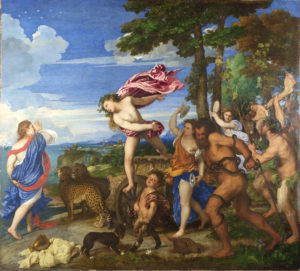Here is my translation of Lorenzo de’ Medici’s Song of Bacchus, also known as The Triumph of Bacchus and Ariadne, from a collection called “Carnival Songs.” (Canzon di Bacco, ovvero Il trionfo di Bacco e Arianna, dal volume Canti Carnescialeschi.)
Translation (c) 2016 by Christopher DiMatteo. All rights reserved.
Here is me, reading my own translation:
Song of Bacchus by Lorenzo de’ Medici (1449-1492)

Lorenzo de’ Medici, painted terra cotta portrait by Andrea Verrocchio, in the National Gallery, Wash. DC, public domain.
Oh how beautiful is youth
And quickly does it flee,
Be happy if you want to,
For tomorrow may not come.
Bacchus here with Ariadne,
Burning for each others love,
Time plays tricks and slips away,
So happily they stay together
With these nymphs and other spirits
They are happy all the time.
Be happy if you want to,
For tomorrow is not certain.
These happy little satyrs
Their beloved nymphs pursue
Down in the caves and into the woods
They lay a hundred loving snares
A warming drink from Bacchus has them
Dancing, leaping, everywhere
Be happy if you want to,
For tomorrow may not come.
These nymphs, they like to let themselves
Be tricked right into capture,
From love they seek no refuge, only
Do they flee the rough and boorish,
Happily they stay together,
Playing music, singing always.
Be happy if you want to,
For tomorrow is not certain
This fat satyr, sitting proudly
on his donkey, is Silenus:
Old and drunk and giddy,
Carries all his flesh and years,
If he can not sit up straight
He still feels joy and laughs it off.
Be happy if you want to,
For tomorrow may not come.
Old King Midas, comes along,
All he touches turns to gold.
What’s the good in having treasure
If you still can not be happy?
How do you expect to taste
The sweetness if your mouth is dry?
Be happy if you want to,
For tomorrow is not certain
Everybody, listen up,
None can graze tomorrow’s pastures,
But today, the young and old,
Happy people, men and ladies,
Chase away all your sad thoughts
Everybody join the party!
Be happy if you want to,
For tomorrow may not come.
So go and play and dance and sing
Let sweetness kindle in your heart
No more work and no more pain!
And we will see what has to be.
So be happy if you want to,
For tomorrow may not come.
[•]
The lyric was written to be set to music and sung during Carnival celebrations. I have experimented with different musical settings of this and in some of them I found it useful to have the extra syllable “So” on the lines “Be happy if you want to” making it “So be happy if you want to.” If this provides a useful accented syllable for your musical setting, that is fine with me. This would be closer the meter of the original, where “Chi” is in the same position.
Another option is how to sing the refrain. In my musical setting, I doubled the line in the original refrain, using its two variations together, once each:
“Be happy if you want to, for tomorrow is not certain;
Be happy if you want to, for tomorrow may not come.”
I invite anyone to set this translation to music. I only ask that if you publish the song, you give me the lyricist’s credit for the translation. I would love to hear as many different musical settings of this as people can make.
Canzon de Bacco, ovvero Il trionfo di Bacco e Arianna, di Lorenzo de’ Medici
(Here is the original Italian text, for comparison. This is one of the most famous verses in Italian. There is great rhythm in this lyric. It can be set to music in any number of ways.)
Quant’è bella giovinezza
che si fugge tuttavia!
Chi vuole esser lieto, sia,
di doman non c’è certezza.
Quest’è Bacco e Arïanna,
belli, e l’un dell’altro ardenti;
perché ’l tempo fugge e inganna,
sempre insieme stan contenti.
Queste ninfe e altre genti
sono allegri tuttavia.
Chi vuole esser lieto, sia,
di doman non c’è certezza.
Questi lieti satiretti,
delle ninfe innamorati,
per caverne e per boschetti
han lor posto cento agguati;
or da Bacco riscaldati,
ballon, salton tuttavia.
Chi vuole esser lieto, sia:
di doman non c’è certezza.
Queste ninfe anche hanno caro
da lor essere ingannate:
non può fare a Amor riparo,
se non gente rozze e ingrate;
ora insieme mescolate
suonon, canton tuttavia.
Chi vuole esser lieto, sia:
di doman non c’è certezza.
Questa soma, che vien drieto
sopra l’asino, è Sileno:
così vecchio è ebbro e lieto,
già di carne e d’anni pieno;
se non può star ritto, almeno
ride e gode tuttavia.
Chi vuole esser lieto, sia:
di doman non c’è certezza.
Mida vien drieto a costoro:
ciò che tocca, oro diventa.
E che giova aver tesoro,
s’altri poi non si contenta?
Che dolcezza vuoi che senta
chi ha sete tuttavia?
Chi vuole esser lieto, sia:
di doman non c’è certezza.
Ciascun apra ben gli orecchi,
di doman nessun si paschi,
oggi sìan, giovani e vecchi,
lieti ognun, femmine e maschi.
Ogni tristo pensier caschi:
facciam festa tuttavia.
Chi vuol esser lieto, sia:
di doman non c’è certezza.
Ciascun suoni, balli e canti,
arda di dolcezza il core:
non fatica, non dolore!
Ciò che ha esser, convien sia.
Chi vuole esser lieto, sia:
di doman non c’è certezza.
[•]

